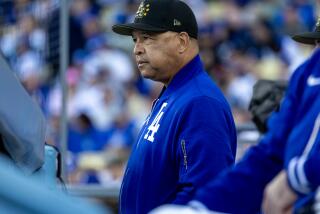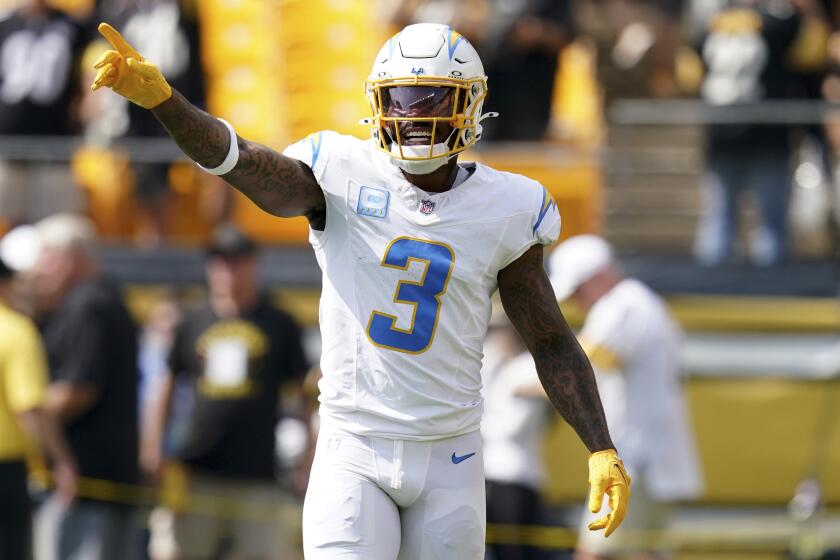Just Wait Until Ueberroth Leaves : Baseball Commissionerâs Impact Should Be Clear Then
You donât miss your water âtil the well runs dry. And baseballâs owners, and perhaps even its fans, will not miss Peter Ueberroth until he is no longer the commissioner of baseball. Even the gameâs union and its press, which never fell in love with the former Olympic czar, may respect him more in absentia.
Ueberrothâs legacy is that he has been the first commissioner who had no power base, no true constituency and tried to please no one but himself. In a sport with a tradition of rule by consensus, he tried to be a competent and often arrogant lone wolf.
âAt my first meeting with the owners, I told them I wasnât going to work for them. . . . I expected them to work for me. . . . Socially and economically baseball was in dire trouble. They could not look to the future on any issue with much confidence,â Ueberroth said Wednesday in an interview.
âHave I had the support of owners since then? Itâs been patchy. . . . I got hung out to dry (with nonsupport) a couple of times. But I learned. You do it other ways. For example, expansion. It will happen . . . in the early â90s . . .
âSupport from players or umpires? I wouldnât say yes. But have the things that needed to happen happened? Yes.â
Although he met with less success in baseball than he had in business or the Olympics, he is leaving the sport stronger than when he inherited it. How much he had to do with that improved health is still a mystery. For a man so skilled in public relations, Ueberroth has spent nearly four years in baseball as a shadowy figure, refusing to take credit or blame for much of anything.
Ueberroth the Enigma struck again last week in San Francisco when he shocked owners by telling them he would not accept a second term in 1990. Bowie Kuhn practically begged to keep the job. Ueberroth, miffed at the 26 owners, who never trusted his brilliance or considered him their leader, gave them back their frustrating hands-tied job.
Try to find somebody better.
Ueberroth said Wednesday he would not even consider a draft. âI think that happened in San Francisco,â he said. âThe answer is âno.â
âThey surprised me. (Minnesota Twins owner) Carl Pohlad said I had well over a majority of the owners in my corner . . . But Iâd made up my mind. I donât believe that this institution should be interrupted (by problems selecting a commissioner). Iâll play a role in helping them select someone of stature who can be independent. Thatâs why I like one term. You really donât act properly in this job without, at one time or another, alienating everybody.â
At that, Ueberroth succeeded. Almost everything else about his years is open to debate. The facts of his tenure are as clear as the interpretations of that data are murky. âBaseball was going in the wrong direction,â he summarizes. âWe slowed it down, stopped it and got it going the other way.â
Few would argue that baseball is frolicsome at the moment. But what single monument has Ueberroth left behind?
âIt doesnât bother me,â the commissioner says of this legacy gap. âYou have to look at yourself, judge yourself.â
The umpires went on strike the day Ueberroth took office--a symbol of the state of disorder that prevailed after Kuhnâs final two years. The next spring, the players threatened a strike. Under Kuhn, who stayed aloof, theyâd walked for 50 days. Under Ueberroth, who spoke out, frequently deflating his owners, the players went out only one day. âIâm still not popular for being anti-salary cap,â he says.
Lee MacPhail often gets credit for the quick solution. But MacPhail was Ueberrothâs choice as âthe most competent man in baseball.â Anything MacPhail did usually had Ueberrothâs fingerprints on it. Or was it the other way around, with the old manâs ideas getting the young commissionerâs OK?
âNot far away there,â says Ueberroth, not really shedding much new light.
When Ueberroth took office, owners screamed bankruptcy. Even discounting their moans by half, it was indisputable that player salaries had to stop rising. The solution the owners chose was collusion--i.e., old-fashioned monopoly. That was the verdict on a 1985 labor case.
The commissioner assumes that this salvation of âthe bottom lineâ is the reason he could now be re-elected. âWhat else?â he says. âSometimes you wonder what motivates people.â
When Ueberroth arrived, a huge drug scandal was ready to erupt. Ueberroth adopted a bluff-and-bluster approach. He suspended and fined players. He set up rules for future offenders; drug testing and counseling in the minors. But, at the major league level, all he could do was say âthe drug problem has been solved.â Some never forgave him what they considered such a facile approach to a real health danger. However, many in baseball feel his private tone of compassion and leniency toward players with problems has helped their recovery.
âThe union canât take credit for our record on drugs, but it should,â Ueberroth said. âThey have been cooperative on every issue, though they canât say it (for fear of appearing too conciliatory). Iâve grown to respect them. Whenever I hear of a potential problem, my first call is always to the union. And the job gets done . . .
âThe situation with drugs and baseball is as good as could be asked,â said Ueberroth, claiming only four new drug problem cases in the last four years.
Ueberroth inherited baseballâs predominantly white front offices, which the Al Campanis flap made patent. In a sense, Ueberroth was delighted. âWe caused that,â he says, cheerfully. âWe honored Jackie (Robinson). We had said long before that we would have to look hard at ourselves.â
According to sources, Ueberroth dreamed up the 40th anniversary celebration for Robinson, complete with patches on every uniform, as a pretext to push his own more-minorities agenda. When Campanis set a match to the TNT, Ueberroth privately saw it as an opportunity, not a problem.
Still, baseball has no black general managers and just one black manager. Once again, Ueberrothâs refusal to scratch backs, trade favors or compromise his independence has cost him any hope of having practical influence.
Some of Ueberrothâs long-term ideas cannot be judged yet. Will there ever be a cable Baseball Channel? What will the next network TV negotiations bring?
The most serious cloud hanging over Ueberrothâs legacy is the possible strike of 1990. Are labor-management relations at an all-time low? Or were they already so bad that even collusion could not make them worse? Ueberroth is in the latter camp. âYou canât break your leg falling out of a basement,â he said.
Ueberroth already was in lightened spirits after announcing his lame-duck status this past week in New York. âIf you care about the institution of baseball, you should declare yourself, âfess up and handle the problem (of succession). Itâs in the baseball bylaws--Judge Landis put it there, I think. Say what youâre going to do 18 months before the end of your term. That was July 1. So I did it in San Francisco.
âIt is important that the new commissioner have a major role in shaping policy in three areas. In order of importance: (1) the new TV agreement (to begin in 1990); (2) an expansion timetable; and (3) the new labor agreement, which will probably be a short one this time--three years.
âItâs not fair for me to hammer out what he has to live with. A new commissioner should be chosen by the end of â88. He should get a chance to run alongside the train before jumping on the tracks.â
Ueberroth says he will be forgotten quickly by rank-and-file fans after Dec. 31, 1989. At least he hopes so.
More to Read
Go beyond the scoreboard
Get the latest on L.A.'s teams in the daily Sports Report newsletter.
You may occasionally receive promotional content from the Los Angeles Times.










